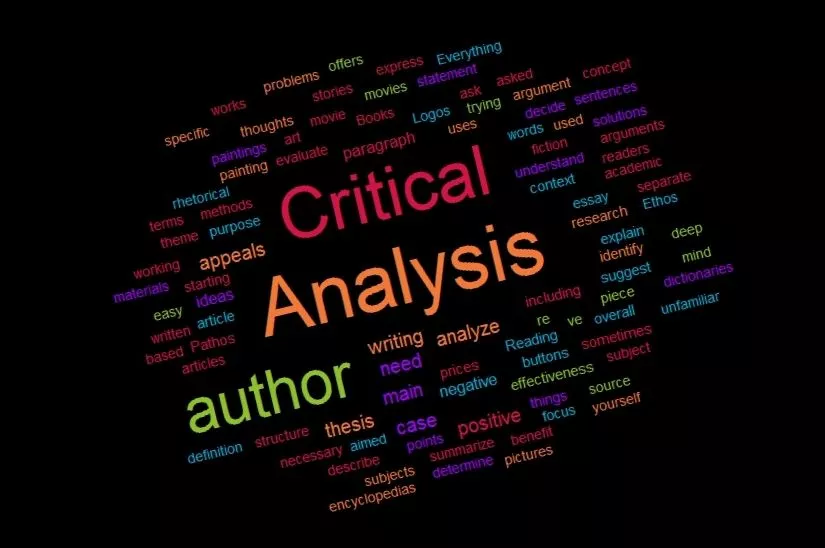
Critical analysis is a type of subjective writing that involves complete examination as well as evaluation of the ideas or works. It generally expresses one’s analysis and interpretation of the work through the process of breaking down and then studying each of the parts. One can write down a critical analysis to review a literary piece, a TV program, or film or it can be an academic report of another person. The presentation of critical analysis is usually in the form of a written essay or a paper or an oral report. Any quality critical analysis evaluates the work or the ideas in a balanced manner so that it focuses is positive as well as negative attributes. One should determine the topic and must have a proper understanding of the same to write a sound critical analysis. There should be total confidence regarding the structure of the essay as well as the use of suitable language techniques.
The outline of the critical analysis should not be ignored. These things must be kept in mind that will enable one to create a perfect critical analysis in terms of both the structure as well as the format. One needs to complete the outline by preparing every section of the essay in sequential order and with proper focus.
The various sources for a critical analysis can be – Books, movies, articles, literary pieces, documentaries, paintings, etc.
The main purpose of critical analysis is to express the writer’s opinion or assessment of a text where the term ‘analysis’ means breaking down and then studying each of the parts. It allows one to gain greater preciseness on the facts and information processed. Moreover, the academic disciplines are always being updated through the process of regular debate, reflection, and refinement of the ideas and concepts. Hence, critical analysis is essential for survival as well as for the renewal of every field of inquiry.
A critical analysis in literature demonstrates a work of poetry, drama, or fiction with the help of interpretations. Any literary analysis aims to extend and deepen one’s comprehension of a literary work.
Critical analysis involves critical thinking which is nothing but using the capacity to reason by being active in one’s study and exploring concepts, arguments, and discoveries. In any academic critical analysis, the various ideas are organized into a sequence of reasoning where the writers’ goal is to convince the readers that their viewpoints are well-grounded. Critical analysis is one of the desirable skills in all aspects of a student’s university work.
Six useful tips to write a critical analysis in English
Avoiding the use of typical phrases:
One should avoid all the cliché words that are frequently used words. Nobody wants to go through trite sentences that are overrated as well as disturbing. All these words or sentences will just degrade the quality of writing causing it to lose its distinctive structure and style. It is one of the smartest ways to avoid any plagiarism because more the creativity, less is the risk of plagiarism in the text. This can be applied in any type of critical analysis.
Providing enough examples:
A great way to help others understand the selected topic is to make use of appropriate examples for the interpretation of the content of critical analysis. By including proper examples, the content becomes attractive and lucid. The examples provided make the critical analysis vibrant. Moreover, suitable examples will enable one to support the ideas and the thoughts expressed with relevance to the entire content.
Efficient brainstorming ideas from the onset:
One needs to determine the time required for topic development, researching, writing, as well as proofreading. These various stages require a certain duration which needs to be estimated before writing any critical analysis. To ensure that the work is of good quality, it should not contain any type of grammatical errors. So, one needs to use language which has grammatical accuracy while writing a critical analysis.
Making the content persuasive:
One must not present selective information regarding some specific piece of literature or any art. Additionally, some convenient, valid, and attractive ideas are required which can convince the readers. The two main keys to writing a successful critical analysis are an extraordinary text style as well as confidence. Appropriate samples should be checked for better results.
Careful organization of the body of critical analysis:
After the introductory paragraph, the essay should be divided into body paragraphs that focus on specific topics. Each body paragraph must serve the principal aim of supporting the main idea either by furnishing the basic information, focussing on the details, or presenting opposing viewpoints. The total number of body paragraphs depends on the extent of the essay. The subject and the structure of the essay are equally important. So, one must plan every body paragraph.
Summarizing the analysis in a concluding paragraph:
One should end the critical analysis by composing a concluding paragraph that recapitulates the argument of the critical analysis. Here, new evidence must not be introduced. A concluding paragraph should contain those significant points to leave with the readers some faculty to consider the whole critical analysis.
In an English critical analysis, the author may review a piece of non-fiction, a literary piece, or any work of art followed by the analysis of the viewpoints of the artist. In this type of essay, the focus is on the thesis, the argument, and the viewpoint of the author by conforming to logical reasoning and presenting the supporting evidence.
The students who are not confident enough about the necessary skills required to write a critical analysis may seek the assistance of our critical analysis writing expert to score good grades in their critical analysis assignment. Also, if they are not able to complete their critical analysis essays within their deadlines, they can visit Dream Assignment and can avail of our critical analysis assignment help which provides online live assistance any time.
